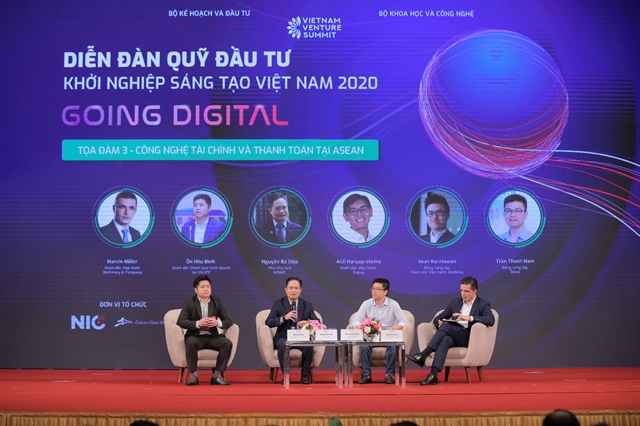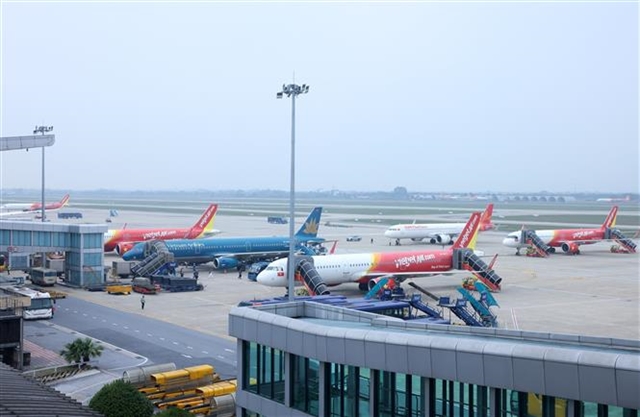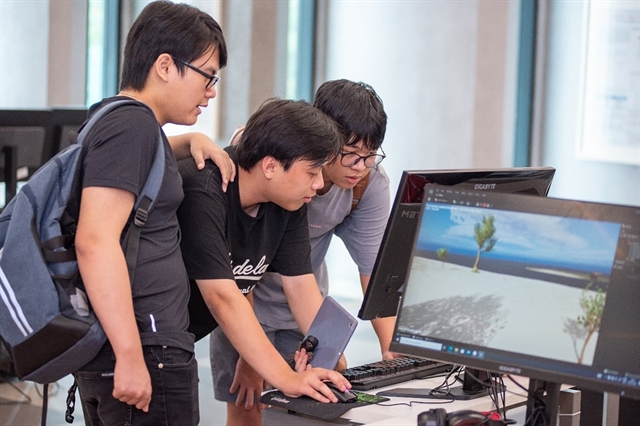 Economy
Economy

The COVID-19 pandemic may have caused disruptions to start-ups and innovative enterprises, but it had also created opportunities for them to turn into real businesses.

|
| Fintech experts join the payment discussion at the Vietnam Venture Summit 2020 in Hà Nội. — Photo Minh Hương |
HÀ NỘI — The COVID-19 pandemic may have caused disruptions to start-ups and innovative enterprises, but it had also created opportunities for them to turn into real businesses.
At the Vietnam Venture Summit 2020 with the theme "Going Digital" in Hà Nội on Wednesday, Minister of Planning and Investment Nguyễn Chí Dũng said Vietnamese start-ups grew well last year with investments worth more than US$800 million. However, the pandemic had completely changed the investment picture this year, revealing the limitations of many start-ups.
Local and foreign investors, funds and start-ups including Golden Gate Ventures, Softbank Venture, Sequoia, ADB Venture, Quiming Venture, VNG, Grab Vietnam, MoMo, GoJek, VNPay and Tiki Sendo represented the different sectors at the summit.
According to the National Centre for Innovation (NIC), Việt Nam was a destination for international investors in both FDI and start-up and innovation.
Dũng said: “This is the right time to continue connecting investors, financial funds and the innovative ecosystem in the region to expand opportunities for co-operation and investment.”
“It is also time for an initiative to attract innovation investment by the Government of Việt Nam,” he added.
Though mentioning the pandemic's influence on many start-ups, Dũng considered some business models and tech firms had become more attractive and grown rapidly. They included online meeting applications, distance teaching apps, e-commerce and logistics for e-commerce.
“This is a pivotal period for Việt Nam, marking the beginning of a new development wave of the Vietnamese innovation ecosystem. It is time for the country to focus on promoting its creative capacity through science, technology and innovation, making it a driving force for rapid and sustainable economic development,” he said.
At the summit, Joonpyo Lee, CEO of SoftBank Venture Asia, said the pandemic had caused disruptions in many areas of the market but had also created an opportunity to turn new technologies into real businesses.”
The lock-down from the pandemic had limited travel but made online shopping, working remotely and transferring money online the best ways to survive, he said.
Changes in consumer behaviour had created great opportunities.
Lee said: "As a start-up investor, I see many opportunities in the transition, which is creating a legacy for the world.”
Nguyễn Thái Hải Vân, a representative of Grab Venture, the first unicorn business in Southeast Asia, said in this difficult context, the advice given to start-ups was to have real preparations that stick to a growth strategy. Of which, team-building was the core factor.
Vân told the summit: "It is better to build talents than to buy talents," mentioning after six years more than 90 per cent of Grab employees in Việt Nam were Vietnamese.
Sharing about market fluctuations in the post-pandemic world, Lukasz Roszczyc, CEO of Publicis Groupe in Việt Nam, said: “Thinking positively about new opportunities, people are spending more time on digital interfaces, smart devices such as TVs, smart home solutions and phones, bringing value to consumers and brands that innovate their approach and create meaningful stories to convey to consumers.”
Serving brands in Việt Nam, the Publicis Groupe leader said: “Many businesses own data about customers who have purchased products, but customer interaction is ineffective. We, with the help of technology and innovation, have helped them to best use the data to promote and attract more potential customers.”
He said the smart communication industry could develop by about 30 per cent in the next two years and a further 50 per cent after that.
Talking at the fintech discussion, one of four topics at the summit, Nguyễn Bá Diệp, vice chairman of MoMo E-wallet, said: “Instead of just being a rooster, we want to be an eagle in our own territory. Even though Việt Nam is inviting many international "eagles" to nest, we could become an eagle with support from the Government."
Diệp said the pandemic had led to remarkable growth for the e-wallet market, with 20 million domestic users currently.
He added: “Before the pandemic, there were 10 million customers, now we have double that.”
Seeing the State Bank of Việt Nam had licensed 38 e-wallets and promoted the use of fintech in the country to encourage digital transformation, Marcin Miller, associate partner of McKinsey & Company, said many Vietnamese people were still using cash, meaning there was more potential for fintech including e-wallets to grow.
MoMo leader Diệp said he aimed to reach at least 50 per cent of the population, or 50 million users, with their wallet.
Co-hosted by the Ministry of Planning and Investment, Ministry of Science and Technology, and co-organised by the National Innovation Centrr and Golden Gate Ventures, the summit included seminars combining online and offline speakers in Việt Nam and in the region on the topics of unicorn hunters, education, technology, fintech and payment in ASEAN and regional logistics.
According to a new report by McKinsey & Company, Việt Nam could capture VNĐ2,400 trillion (more than $100 billion) by 2025 through the formation of 12 large digital ecosystems across retail and institutional services.
These digital ecosystems constituted interconnected services from different industries that enabled automation on a large scale and integrated purchasing pathways, giving customers access to a variety of products and services on a single platform, said the report. — VNS




